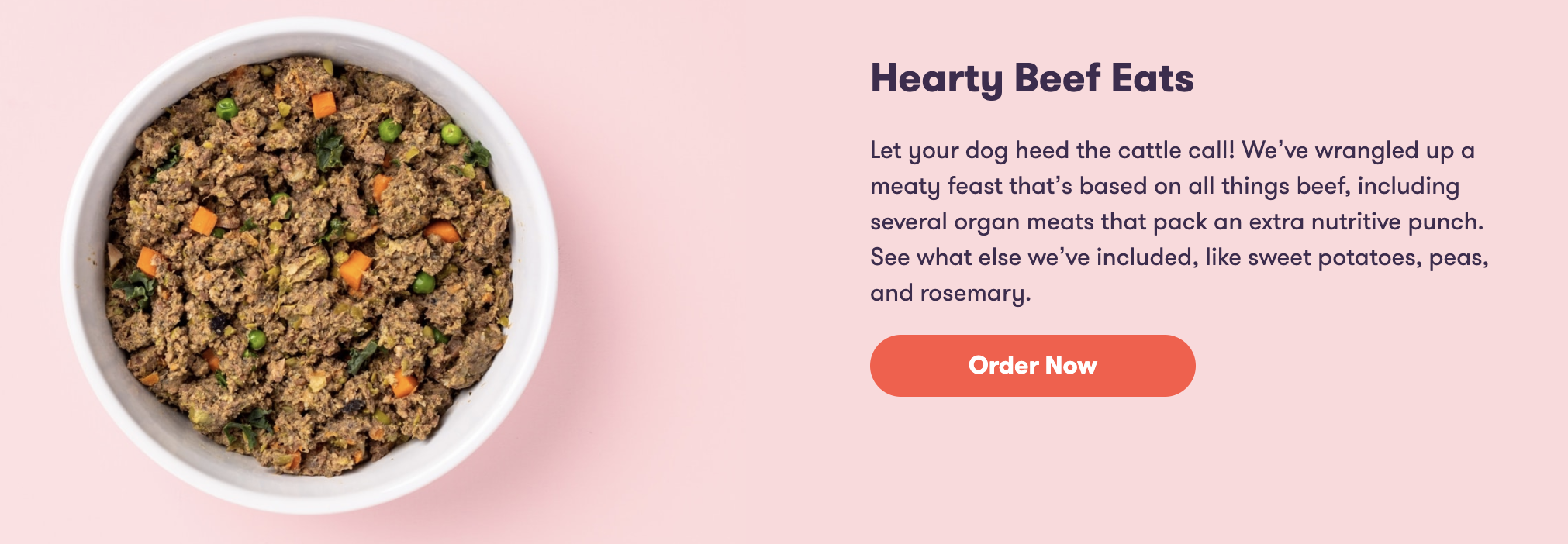Hey Ollie blog readers! We’re offering you an exclusive 60% OFF your starter box! Try now!
For quite some time now, humans have been obsessing over oils—eating them, cooking with them, wearing them, naming their children after them. (“Have you met my twins, Krill and Flaxseed?”) It turns out that oils are awesome for dogs’ health too: The benefits include everything from better digestion to a shinier coat. We profiled five all-stars, where you can find them, and how much your pup needs.
1. Fish Oil
There seems to be as many fish oils as fish in the sea (e.g. cod liver oil, herring oil, salmon oil), each boasting different benefits. But generally speaking, a fish oil blend derived from salmon, herring, sardines, albacore tuna, and other fish will offer the most omega-3 fatty acids and the longest life of the product.
What it’s best for: Two of those omega-3 fatty acids are particularly therapeutic: EPA, which helps reduce inflammation and may improve kidney function, and DHA, which plays an important role in development, learning and vision. Specific liver oils, like cod liver oil, are best used to provide vitamins that need fat to be absorbed, like A and D.
Where to find it: Fish oils high in EPA and DHA are available in pump bottles or capsules. Like all fats, the ones in these pills or liquids can oxidize and go bad over time. Storing them in your refrigerator will slow the process of oxidation. Fresh dog foods often contain fish oil, as well.
Dose: 1000 mg of a fish oil supplement (containing 300 mg of EPA/DHA) for every 30 pounds of body weight is a good rule of thumb for general health. But dosage should be calculated with your dog’s regular diet in mind to maintain balance. Some diets are already rich in EPA and DHA, and too much fish oil can lead to an upset stomach or have a blood thinning effect.
2. Sunflower Oil
This high-quality oil is a great source of omega-6 fatty acids (omega-3’s cousin) and is lower in saturated fat than animal fat. Though saturated fats are not a contributor to cardiovascular disease in dogs as they are in humans, if your dog is prone to sensitive stomach, they may cause issues.
What it’s best for: Healthy skin, immune function, heart health, providing energy, preserving normal organ function. The biggest reason humans chose this supplement is because it often increases coat sheen.
Where to find it: Sunflower oil is more common as an ingredient in food and treats because a certain amount of linoleic acid, the omega 6 in sunflowers, is required to maintain a balanced diet. Bottled sunflower oil is often easiest if you do want to supplement.
Dose: Supplementation is most often beneficial in dogs on home-cooked diets. A dose for a medium dog should be about 1 teaspoon daily, which will offer about 5-8 grams of this omega 6. Remember that all fats are a rich source of calories, with 1 teaspoon of sunflower oil equating to 40 calories or so. And be sure to take any omega-3 supplementation into account too.
3. Flaxseed Oil
Boasting a blend of omega-3 and omega-6 fatty acids, flaxseed can be a substitute supplement for fish oil for dogs who have allergies or reactions to fish. Unlike humans, though, dogs aren’t the best at converting flax’s omega 3s to those found in fish (EPA and DHA), so the benefits aren’t as great for them.
What it’s best for: Reduced inflammation, arthritis treatment, healthy coat, and allergy relief.
Where to find it: Ground flaxseed (whole flaxseed will pass through the system undigested) is the best and safest form of this oil and also provides fiber to help maintain a healthy gut, since all pressed oils have a short shelf life.
Dose: Small dogs (under 30 lbs) can have 1/2 teaspoon of oil or ground flaxseeds daily, 1 teaspoons for medium dogs, 2 tsp for large dogs and 1 tablespoons for very large dogs. Divide the dosage in two, morning and night, to avoid diarrhea.
4. Coconut Oil
This magical oil is easy to metabolize and boasts more than 90% of healthy saturated fats with smaller amounts of a few unsaturated fatty acids. Most of the saturated fats in coconut oil are [Medium Chain Triglycerides (MCTs), which have a growing list of healthy benefits.
What it’s best for: Reduced allergy symptoms, increased energy, improved digestion, improved cognitive function (especially for senior dogs), weight loss, benefits for dog’s skin and coat.
Where to find it: Organic, virgin, cold-pressed coconut oil (p.s. dogs love the taste!)
Dose: A fourth of a teaspoon for every 10 pounds of dog, twice daily. This will add some calories (40 for every tsp), so make sure you take this into account with the rest of their diet so they don’t gain weight.
5. Olive Oil
Rich in antioxidant capability, thanks to its polyphenols, vitamin E, chlorophyll, and carotenoids, this oil boasts some serious health benefits for dogs. Known for breaking down the fat inside fat cells, olive oil is especially helpful for dogs on a weight-loss plan.
What it’s best for: Weight loss, improved immune function, healthy skin and coat. It may also be good for those dogs that don’t tolerate the omega 3 or 6 fatty acids due to GI upset.
Where to find it: The one’s easy: organic, extra-virgin olive oil.
Dose: For dogs under 20 pounds, add half a teaspoon a day to their food, a teaspoon for a 30 to 40 pound dog, and up to a tablespoon for dog 50 pounds or larger. Each teaspoon is about 40 calories.
The Ollie blog is devoted to helping pet parents lead healthier lives with their pups. If you want to learn more about our fresh, human-grade food, check out MyOllie.com.
Tagged As:

The nutrition your dog needs,
the food they want.

Enjoying our articles? Subscribe our Newsletters and get new articles directly to your inbox
You might also like
17 October 2025
6 MINS READ
Choosing the Best Food to Fuel Your Puppy’s Strong Future
As a new pup parent, you have the responsibility of laying the foundation for your puppy’s future health. The nutritional choices you make during their first year are crucial, directly influenci…
by Ollie Pets
17 October 2025
3 MINS READ
Gentle Human-Grade Solutions for Sensitive Stomachs
Watching your dog suffer from a sensitive stomach is always stressful, and the constant worry about gas, loose stools, or vomiting can be overwhelming. Fortunately, a high-quality, easily digestib…
by Ollie Pets
17 October 2025
5 MINS READ
Choose Fresh: The Best Dog Food for Allergy Relief
As a pup parent, there’s nothing worse than seeing your dog in distress. The constant scratching, irritated skin, or upset stomach that comes with allergies can be heartbreaking. The good news is …
by Ollie Pets








